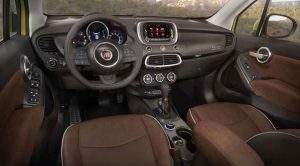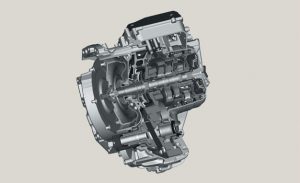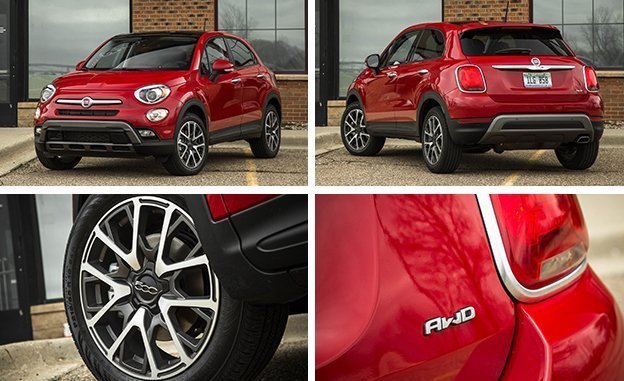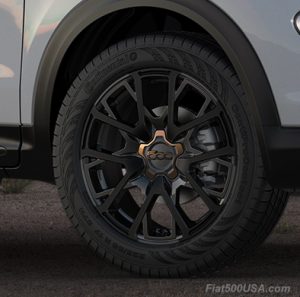What worked so well for Mini hasn’t panned out nearly as well for the other company that specializes in mini cars:
That would be Fiat.
It’s hard to understand why. Are Fiats bad cars? Not now. Maybe back in the late ’70s they were – but then, so were everyone’s cars. Hyundais were synonymous with bad (and worse) as recently as the ’90s – and they sell hand-over-fist today.
So, what’s the problem?
Well, the 500 hatchback – Fiat’s main model, the one that brought the brand back to the U.S. in 2012 – is maybe too small for American tastes. It is almost a foot stubbier than the Mini and even though it is remarkably roomy for its size on the inside, it appears that not enough Americans are comfortable with its size on the outside.
This is understandable given the size of other cars on American roads. Of crossovers and SUVs especially.
They are monstrous compared with the Mini.
And compared with the 500 hatchback . . .
Which also suffers from a lack of more doors. Just two, not counting the rear liftgate. Mini, meanwhile, sells versions of its min-car with two and four doors and even outward-swinging saloon doors out back, if you prefer.
The Mini Cooper is available with all-wheel-drive, too. The 500 hatch is front-drive-only.
This accounts for the 500X.
It is almost two feet longer overall than the 500 hatch, has four doors and almost twice the cargo space, a roomier second row and – if you like – all-wheel-drive.
Maybe it’s the Fix that “Tony” has been looking for.
The 500X is a compact crossover SUV, a notch smaller than something like a Honda CR-V (and about the same size as an HR-V).
It’s related to the Jeep Renegade – Jeep being owned by Chrysler – and Chrysler now owned by Fiat. The 500X shares engines with its Jeep cousin and offers AWD – but doesn’t have the Jeep’s additional off-road capability.
It emphasizes style and on-street performance instead.
Base price is $19,995 for the Pop trim with a turbocharged 1.4 liter engine, front-wheel-drive and six-speed manual transmission. This is the only version of the 500X that’s available with a manual transmission – and it’s also the only version that comes with the Fiat-sourced 1.4 liter turbo engine. 
All other trims – Trekking, Lounge and the new-for-2018 Urbana – come standard with a larger (not turbocharged) 2.4 liter engine paired with a nine-speed automatic. You can choose FWD or AWD with any of these trims.
Prices top out at $27,415 for an AWD-equipped Lounge, which comes standard with all the equipment included with Trekking trims (17-inch wheels in place of the base Pop’s 16s, an upgraded LCD display, driver-selectable modes for the automatic transmission, fog lights) plus an upgraded eight-speaker Beats audio rig and the option to buy things like a full-length panorama glass roof, mocha-java leather seat covers and a nine speaker premium Beats audio system.
Though closely related to its American cousin, the Jeep Renegade, the 500X is most similar in looks and layout but not price to the Mini Clubman – which starts at $24,100 – several thousand dollars more than the base Pop trim 500X.
For the most part, the 2018 500X is the same as before – even including its base price, which Fiat is holding the line on to entice buyers.
The main difference – for the moment – is the new Urbana trim, which slots under the Lounge and above the Trekking version. Like them, it comes standard with the 2.4 liter engine and your pick of FWD or (optionally) AWD. Unlike them, it gets dipped in a unique charcoal paint not offered with other trims and also gets additional unique-this-trim … er, trim.
It is possible that later in 2018, Fiat will offer a high-performance Abarth version of the 500X.
Available with either of two engines – and you can get a manual transmission with one of them. Many small crossovers offer just one engine – and are automatic only.
Roomier back seat than the 500 hatchback.
About 40 percent more room for cargo than 500 hatchback.
Good gas mileage (25 city/34 highway) with the standard 1.4 liter engine.
WHAT’S NOT SO GOOD
Manual only offered with the 1.4 liter engine – which is only available in the base Pop trim.. which isn’t available with AWD.
Optional 180 hp engine guzzles gas, especially AWD-equipped versions.
Base 1.4 engine requires premium unleaded.
Less total cargo space than most rivals.
The 500 X comes standard with the same Fiat-built 1.4 liter turbocharged four that’s used in the 500 hatch – but unlike the 500 hatch, you can upgrade the X to a larger “Tigershark” 2.4 liter engine, if you want more power.
The 1.4 liter engine is pretty powerful, though.
Relative to what you get in rivals, anyhow.
It makes 160 hp pushing 22 pounds of turbo boost. That’s a lot of boost. And the resultant output is strong compared with – as a cross-reference – the Honda HR-V’s 1.8 liter, 138 hp engine, the Mazda CX-3’s 2.0 liter, 146 hp engine – and absolutely blows the poor little Chevy Trax’s 1.4 liter, 138 hp engine right out of the water.
None of these models offer a more powerful optional engine, either.
You can also get a manual (six-speed) transmission in the Fiat – a rare feature in the class and small crossovers, generally.
Unfortunately, Fiat only offers the manual gearbox with the base 1.4 engine – and that engine is only available in the base Pop trim, and only with front-wheel-drive.
All other versions of the 500X come with the larger 2.4 liter engine; it makes 180 hp – but comes only with the automatic.
You can, however, choose either FWD or AWD.
Acceleration is good for this class of vehicle: 0-60 takes about 8.8 seconds with the 2.4 liter engine and FWD. That’s right there with the HR-V and CX-3 (and much speedier than the under-engined Chevy Trax, which needs 10-plus seconds to break 60).
However, the Fiat’s gas mileage is lower than rivals when equipped with the 2.4 liter engine.
Best-case is 22 city, 31 highway for the FWD version; with AWD, this drops to 21 city, 30 highway.That’s about 5-8 MPG below what rivals like the HR-V (28 city, 35 highway with FWD; 27 city/32 highway with FWD) and CX-3 (29 city, 35 highway; 27 city/32 highway with AWD) deliver.
In real-world driving, you should expect to average low 20s.
The 1.4 engine’s mileage, on the other hand, is pretty good – 25 city, 34 highway – however (and weirdly) this engine requires premium unleaded fuel. The 2.4 liter engine – the optional (and higher-performance) engine – is a regular fuel engine.
Remember that bit about 22 pounds of turbo boost?
The X’s rivals – including the Chevy Trax, which is turbo’d, too – all take regular. As they probably ought to, given these are budget-minded vehicles.
The nine-speed automatic has sport/manual modes and there are three driver-selectable settings (Normal, Rain/Snow and Sport) for the optional AWD system. This is similar to the Jeep Renegade’s optional system, but it doesn’t have the Rock crawl/off-road setting you can get in Trailhawk versions of the Jeep.
The Fiat’s is an on-road/street-driving-intended set-up, like the available AWD systems in rivals like the HR-V, Trax and CX-3.
The Fiat does have more ground clearance than most of its rivals: 7.9 inches with all-wheel-drive (about an inch less with FWD) vs. 6.1 inches for the CX-3, 6.7 inches for the Honda HR-V and 6.2 inches for the Chevy Trax. This should help get you through on snow days – but if you’re looking for more in the way of off-pavement capability, you might want to take a look at the Renegade. It’s the only subcompact crossover currently available with a Low range gearing feature as well as off-road terrain settings (sand/gravel/mud, etc.).
Though it’s still small relative to the average car (for perspective, a compact sedan like the Toyota Corolla is more than a foot longer overall) the X feels less small – less vulnerable – than the 500 hatchback. Especially on the highway. Probably because of the additional 109.6 inches of wheelbase (101.2 vs. 90.6 for the 500 hatchback) and several hundred pounds more curb weight (3,278 lbs. for the AWD model vs. 2,865 lbs. for the 500 hatchback).
The 500 hatchback is highway-capable but being tall and short and light is not ideal for dealing with the slipstream of passing Kenworths. The 500 X is much better suited for such duty while still being small enough to be easier to maneuver in urban/suburban areas than the typical car.
Arguably it is slightly better in that role than its rivals – by dint of being slightly smaller-on-the-outside than all of them except the Trax (which is exactly the same overall length, 167.2 inches).
The Honda HR-V, for instance, is a couple inches longer overall (169.1 inches) so it’s that much less able to slot into and out of tight curbside parking spaces downtown. It also has a noticeably wider turning circle – 37.4 feet vs. 36.3 for the Fiat.
The Mazda beats them both, though – with the tightest turning circle in the class (34.8 feet).
Both of the Fiat’s engines deliver class-competitive acceleration, even if the 2.4 liter engine is thirsty.
The standard 1.4 engine’s 184 ft.-lbs. of torque (available at 2,500 RPM) is especially noteworthy because it provides the low-end torque that’s absent in rivals – or rather, which you have to work their engines harder to access.
The HR-V’s significantly lower peak output of 127 ft.-lbs. doesn’t happen until the engine spins to 4,300 RPM.
Only the Chevy Trax comes close – with 148 ft.-lbs. available at just 1,850 RPM.
Like the Fiat, the Chevy’s engine is turbocharged – and the turbo boost is what accounts for the healthy torque numbers. However, the Chevy manages those numbers on regular unleaded – while the Fiat must have premium to deliver them.
That’s odd, given the 1.4 engine is the economy engine in the lineup.
The optional nine-speed automatic (which is effectively the standard transmission in all trims except the base FWD Pop) has four overdrive ratios. Sixth (0.81), seventh (0.70), eighth (0.58) and ninth 0.48) are there to cut revs – and thus, save gas.
In actuality, the nine-speeded Fiat’s numbers are not as good as rivals’ numbers, despite those rivals having transmissions with only six gears.
Or no gears at all – if they have a CVT automatic.
Part of the reason for this, of course, is that the 500X has more engine and that necessarily entails a bigger appetite. It’s also heavier than its rivals, two of which (the Trax and the CX-3) weigh just over 2,800 lbs. or about the same as the much smaller 500 hatchback.
And the 500X would surely be even thirstier if it didn’t have those four overdrive gears.
But the downside of all those gears is a fairly busy transmission that’s been programmed to seek out those higher gears as soon as possible, in order to to eke out the MPGs. That means lots of transitions because of the distance (ratio-wise) between say 4th or fifth and eighth or ninth.
A six speed automatic might downshift two gears under moderate pedal.
The Fiat’s box might need to drop down three or more.
It’s hard to make that feel smooth – and often, it doesn’t feel smooth.
Unfortunately, government fuel-efficiency mandates rather than buyer/market demand are driving such extreme solutions as nine (and soon ten) speed automatics with multiple overdrive gears on top.
Absent government strong-arming, Fiat might have been able to offer the hunky 2.4 liter engine with the six-speed manual transmission. This would have made the thing much more fun to drive – and less busy to drive – if slightly less economical to drive.
But Fiat can’t – because of the pressure coming from the government.
Which is why you can’t get a manual with the bigger engine.
The 500 X is a cheerful-looking thing. Even the seatbelt buzzer makes a happy sound.
Like the 500 hatch, you can get features similar-to-the-500 hatch’s, including body-colored trim plates and ambient mood lighting.
The Trekking trim sounds rugged, but don’t be fooled. A Jeep in Fiat drag it may be, but it’s more looks than goods. You’ll get a different front clip, fog lights and an 18-inch wheel/tire package – but no skid plates or Low range gearing.
Head to your Jeep store for those things.
You can, however, get in-car WiFi, a heated steering wheel and 2D/3D GPS mapping.
The X is about two feet longer overall than the 500 hatch and has 12.2 cubic feet of cargo capacity behind its second row; 50.8 cubes with the second row down. The latter is about 40 percent more cargo space than the hatch – which maxes out at 30.2 cubic feet with its second ro folded flat.
The hatch also has tighter backseats – both in terms of legroom (31.7 inches vs. 34.8 in the 500X) and headroom (35.6 in the hatch vs. 37.8 in the X).
The X’s cargo area also has additional versatility in the form of a secondary storage compartment hidden under the main trunk floor.
Bu while it is roomier than its 500 hatch littler brother, it’s not as roomy as rivals like the Honda – which gives you 23.2 cubic feet of cargo capacity with its second row seats in place and 59 cubic feet with them folded down (best in class).

The Mazda CX-3 also has about the same backseat legroom (35 inches) and significantly more total cargo capacity (44.5 cubic feet).
The often-insulted Chevy Trax does well on both counts, with 35.7 inches of second row legroom and a very impressive 48.4 cubic feet of total cargo capacity, nearly as much as the Honda.
THE REST
The base $19k Pop trim is very competitively priced relative to the Mini Clubman and also vs. rivals like the HR-V, CX-3 and Chevy Trax, but when you add AWD the just-under-$19k-to-start price jumps to almost $24k and now you’re looking at spending about what you would to get into a Clubman and more than you would for the AWD-equipped versions of the Honda ($23,125) and a lot more than you would for the least expensive AWD-equipped versions of the Mazda ($21,210) and the Chevy ($21,620).

The chief worry, though, is the future of Fiat – which looks increasingly iffy.
They’ve stopped building them in the U.S. (all U.S. production is now focused on the better-selling Jeeps) and if Fiat stops selling them here it will probably mean that resale values of cars already sold will take a dive.
That’s the usual course of events with orphaned cars.
On the other hand, slow sales mean good deals. I have a friend who just bought a left over 500 hatch – brand new but one year old – for $10,000 less than sticker.
THE BOTTOM LINE
More doors, more room – and more options – worked for Mini.
Maybe it will work for Fiat, too.
. . .
Got a question about cars – or anything else? Click on the “ask Eric” link and send ’em in!
If you like what you’ve found here, please consider supporting EPautos.
We depend on you to keep the wheels turning!
Our donate button is here.
If you prefer not to use PayPal, our mailing address is:
EPautos
721 Hummingbird Lane SE
Copper Hill, VA 24079
PS: EPautos stickers are free to those who send in $20 or more to support the site. Also, the eBook – free! – is available. Click here. Just enter you email in the box on the top of the main page and we’ll email you a copy instantly!



















